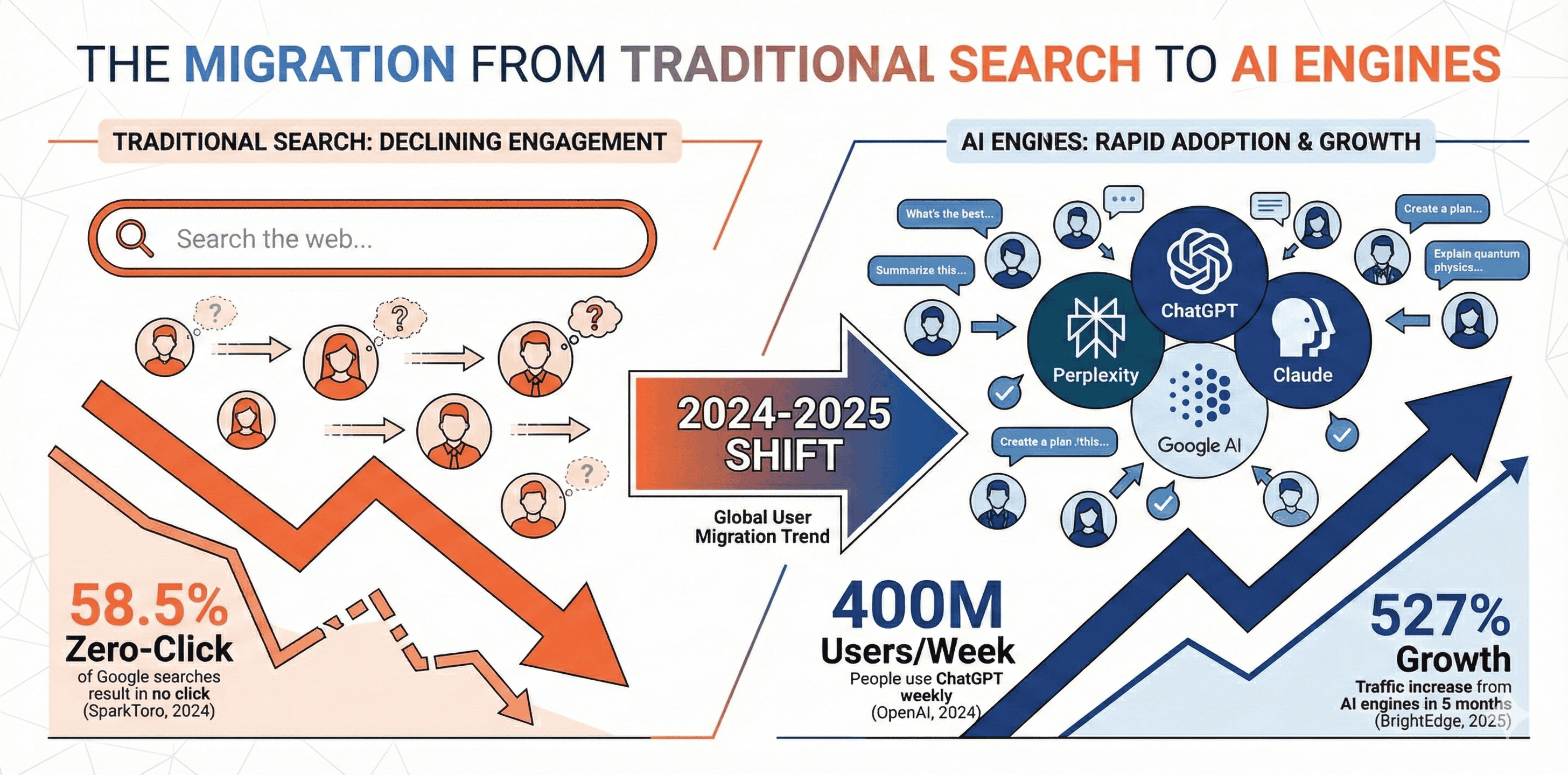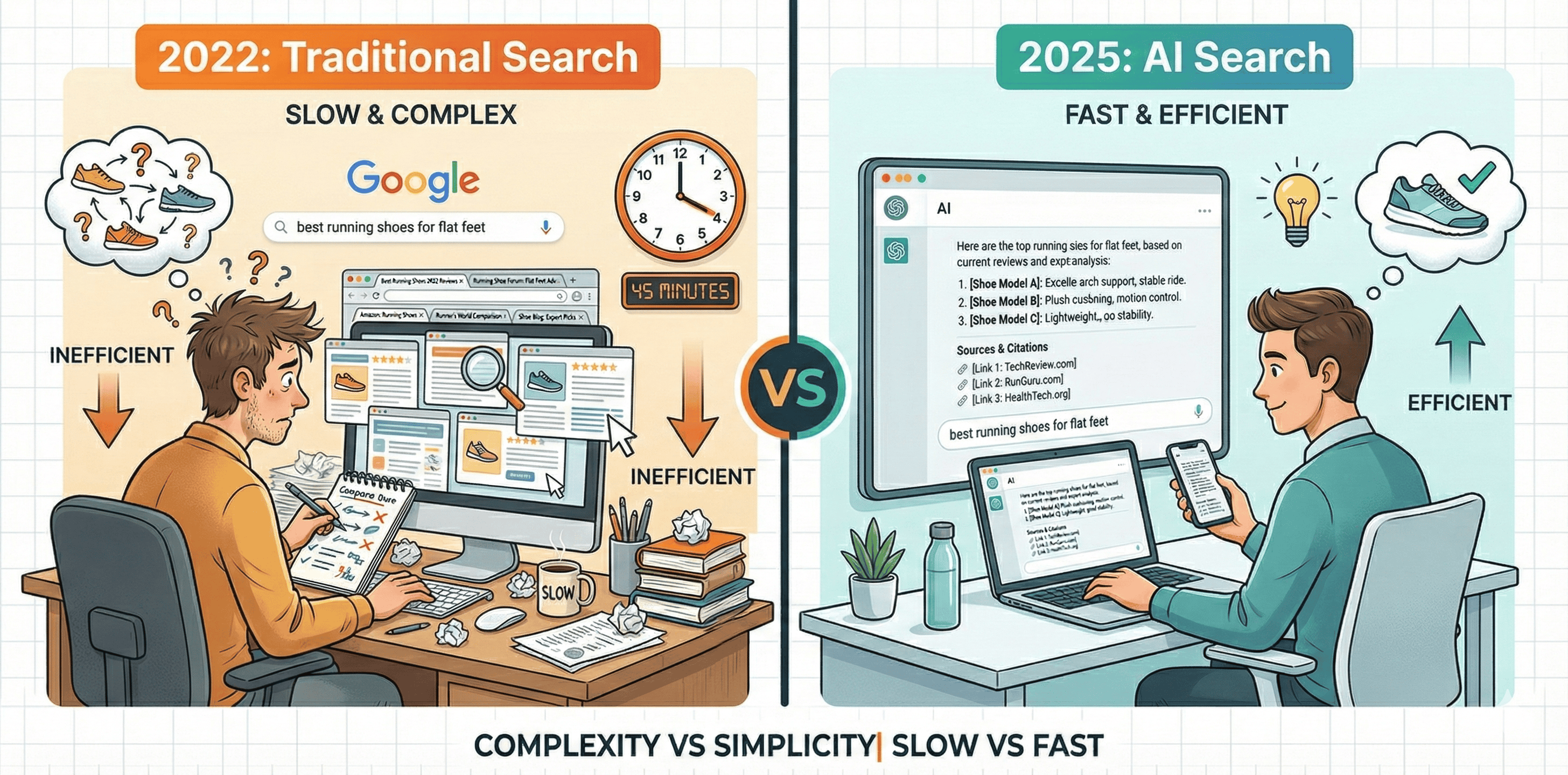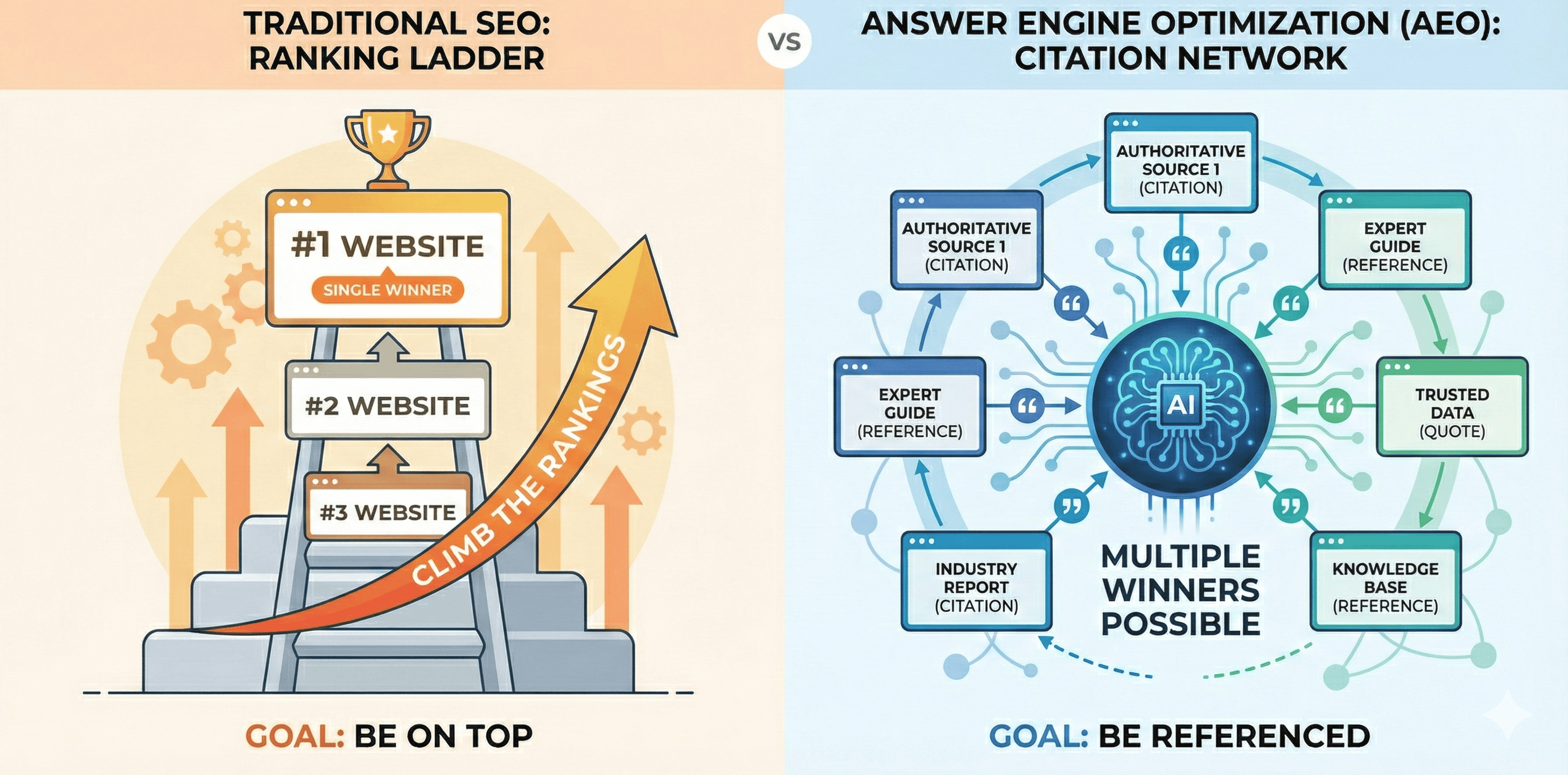The Shift from Search to Answer Engines
Why Your Website Is Becoming Invisible (And What to Do About It)
In 2024, Google searches decreased for the first time in history. Where did those users go? And more importantly, how do you ensure they find YOUR website?
The Decline of Traditional Search
Something fundamental has shifted in how people find information online.
The numbers tell the story:
- 58.5% of Google searches now result in zero clicks (SparkToro, 2024)
- 400 million people use ChatGPT every week (OpenAI, 2024)
- LLM-referred traffic surged 527% from January to May 2025 (BrightEdge, 2025)
What this means: More than half of all searches never visit a website. Users get their answer directly from Google's AI Overview, ChatGPT, Perplexity, or Claude—and they're done.

A Real Example
Traditional search (2022):
User searches Google for "best CRM for small business." They see 10 blue links. They click through 3-5 websites. They compare features. They make a decision.
AI search (2025):
User asks ChatGPT: "What's the best CRM for a 12-person marketing agency with limited tech skills?" ChatGPT synthesizes information from multiple sources and provides a detailed recommendation in 30 seconds. The user never visits your website—even if you're the perfect solution.

Why This Matters for Your Business
If your website isn't being cited by AI engines, you're invisible to this rapidly growing audience. And that audience is your future customers.
Industry examples:
- Legal services: Potential clients ask Perplexity "best business attorney in Austin" instead of Googling and clicking through lawyer websites
- SaaS companies: Buyers ask ChatGPT "compare project management tools for remote teams" and get recommendations without visiting product pages
- E-commerce: Shoppers ask Claude "best running shoes for marathon training" and receive curated suggestions with pros and cons
In each case, if you're not cited by the AI, you don't exist in that customer's decision-making process.
What Is Answer Engine Optimization (AEO)?
Answer Engine Optimization (AEO) is the practice of structuring your content so AI platforms cite and reference your website when generating responses.
How It's Different from SEO
Traditional SEO optimizes for rankings—appearing #1 in Google search results.
AEO optimizes for citations—being mentioned and referenced by AI engines in their synthesized answers.
| Traditional SEO | Answer Engine Optimization (AEO) |
|---|---|
| Goal: Rank #1 in search results | Goal: Get cited by AI engines |
| Metric: Search ranking position | Metric: Citation frequency and prominence |
| User action: Click through to site | User action: See your brand in AI answer |
| Focus: Keywords and backlinks | Focus: Clear, extractable, authoritative statements |

The Technical Term: GEO
In academic research, this is called Generative Engine Optimization (GEO). A landmark 2024 Princeton University study demonstrated that specific optimization methods can boost visibility by up to 40% in AI engine responses.
We'll use "AEO" and "GEO" interchangeably—they mean the same thing.
The Early Adopter Advantage
Here's the opportunity: Only 20% of marketers have started AEO optimization (Acquia Survey, 2025).
This means you have a significant first-mover advantage—but that window is closing.
What early adopters are seeing:
- 527% increase in AI-referred traffic (BrightEdge, 2025)
- 4.4x better conversion rates from LLM traffic vs. traditional search (Profound, 2024)
- Higher brand authority and visibility in their industry
What Companies Can Expect
These are examples of the types of results businesses in different industries might see when implementing AEO strategies:
B2B SaaS Companies:
A project management software company could implement basic AEO strategies and appear in 12-15 of 20 industry-related ChatGPT queries within 6-8 weeks. This type of visibility might take 9+ months to achieve through traditional SEO alone.
Professional Services Firms:
A consulting firm that optimizes its website content using AEO principles could be cited in 40-60% of AI queries related to their specialty (e.g., "digital transformation consulting"). Competitors who haven't optimized might see citation rates of 15% or less.
E-commerce Retailers:
A specialty retailer that adds structured product information and statistics could become a source that AI engines cite for technical product recommendations. This qualified traffic typically converts 2-4x better than traditional search traffic.
Key Concepts to Understand
What are "AI engines" or "answer engines"?
AI engines (also called answer engines or generative engines) are platforms that use large language models (LLMs) to generate synthesized answers to user queries.
Major platforms include:
- ChatGPT (80.92% market share) - OpenAI's conversational AI
- Perplexity (8.08% market share) - AI search engine with citations
- Google AI Overviews - Google's AI-generated answers at top of search results
- Claude (Anthropic) - AI assistant with web search capabilities
- Microsoft Copilot (5.19% market share) - Microsoft's AI assistant
- Gemini (2.19% market share) - Google's standalone AI chatbot
Together, these platforms are used by hundreds of millions of people weekly.
What is a "zero-click search"?
A zero-click search occurs when a user gets their answer directly on the search results page without clicking through to any website. This includes Google's AI Overviews, featured snippets, and knowledge panels. As of 2024, 58.5% of all searches are zero-click.
What is an "LLM"?
LLM stands for Large Language Model—the AI technology that powers ChatGPT, Claude, and other AI assistants. These models are trained on vast amounts of text data and can understand context, synthesize information, and generate human-like responses.
Knowledge Check
Test your understanding of today's lesson:
Question 1: What percentage of Google searches now result in zero clicks?
Answer: 58.5%
More than half of all Google searches end without the user clicking any result. They get their answer directly from Google's AI Overview or other on-SERP features.
Question 2: True or False: AEO and SEO use identical optimization strategies.
Answer: False
While AEO and SEO share some foundational principles (quality content, authority, clarity), they require different approaches. SEO focuses on ranking and keywords; AEO focuses on being cited by AI engines through clear, extractable, authoritative statements.
Question 3: What was the percentage increase in LLM-referred traffic from January to May 2025?
Answer: 527%
LLM-referred traffic increased by 527% in just 5 months, demonstrating the explosive growth of AI-powered search.
Key Takeaways
- Traditional search traffic is declining while AI engine usage is exploding (400M+ ChatGPT users weekly)
- 58.5% of searches are now zero-click — users get answers without visiting websites
- AEO is about being cited by AI, not just ranking on Google
- Only 20% of marketers have started optimizing, giving early adopters a significant advantage
- Results are measurable — early adopters see 527% traffic increases and 4.4x better conversion rates
What's Coming Tomorrow
You now understand WHAT Answer Engine Optimization is and WHY it's critical.
Tomorrow, you'll discover HOW AI engines actually work—the hidden algorithm that determines which websites get cited and which get ignored.
Continue to Day 2 →Want Help with This?
Jumping Ahead automates AEO for you. We track your website and 5 competitors across all major AI engines, send you monthly reports showing exactly where you stand, and provide a prioritized playbook of what to optimize next.
- Track 3 websites (with 5 competitors each)
- Automated competitive analysis every month
- Quick wins identified based on your specific gaps
- Save 50+ hours of manual tracking and analysis
Sources Cited in This Lesson:
- SparkToro Zero-Click Search Study, 2024
- OpenAI Usage Statistics, 2024
- BrightEdge LLM Traffic Report, 2025
- Acquia Marketer Survey, 2025
- Profound AI Search Analytics, 2024
- Princeton University GEO Study (Aggarwal et al., 2024)
 5dayAEO
5dayAEO